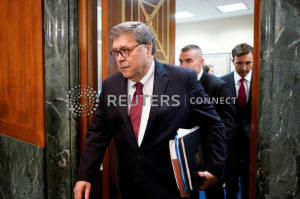|
Barr cancels second day of testimony,
escalating battle with U.S. Congress
 Send a link to a friend
Send a link to a friend
 [May 02, 2019]
By Andy Sullivan and Sarah N. Lynch [May 02, 2019]
By Andy Sullivan and Sarah N. Lynch
WASHINGTON (Reuters) - Attorney General
William Barr on Wednesday canceled plans to testify before the House of
Representatives about his handling of Special Counsel Robert Mueller's
Russia investigation, further inflaming tensions between U.S. President
Donald Trump and Democrats in Congress.
Barr was due to face the Democratic-controlled House Judiciary Committee
on Thursday, but pulled out after the two sides were unable to agree on
the format for the hearing.
"It's simply part of the administration's complete stonewalling of
Congress," Judiciary Committee Chairman Jerrold Nadler told reporters.
Justice Department spokeswoman Kerri Kupec said Nadler's proposal to
have committee lawyers question Barr was "unprecedented and
unnecessary," saying questions should come from lawmakers.
The Justice Department also said on Wednesday it would not comply with a
Nadler-issued subpoena seeking an unredacted version of Mueller's report
and underlying investigative files from the probe.
Earlier on Wednesday, Barr spent more than four hours before the
Republican-controlled Senate Judiciary Committee where he fended off
Democratic criticism of his decision to clear Trump of criminal
obstruction of justice and faulted Special Counsel Robert Mueller for
not reaching a conclusion of his own on the issue.

In his first congressional testimony since releasing a redacted version
of Mueller's report on April 18, Barr also dismissed Mueller's
complaints that he initially disclosed the special counsel's conclusions
on March 24 in an incomplete way that caused public confusion.
Illustrating tensions between the two men, Barr described as "a bit
snitty" a March 27 letter from Mueller in which the special counsel
urged him to release broader summaries of his findings - a step Barr
rejected. Trump seized on Barr's March 24 letter to declare that he had
been fully exonerated.
Several Democrats on the Senate committee called for Barr's resignation.
Democrats have accused Barr of trying to protect the Republican
president, who is seeking re-election next year. They pressed Barr on
why he decided two days after receiving the 448-page document from
Mueller in March to conclude that Trump had not unlawfully sought to
obstruct the 22-month investigation.
"I don't think the government had a prosecutable case," Barr said.
'ALLEGATIONS NOW PROVEN FALSE'
The report detailed extensive contacts between Trump's 2016 presidential
campaign and Moscow and the campaign's expectation that it would benefit
from Russia's actions, which included hacking and propaganda to boost
Trump and harm Democratic candidate Hillary Clinton. The report also
detailed a series of actions Trump took to try to impede the
investigation.
Mueller, a former FBI director, concluded there was insufficient
evidence to show a criminal conspiracy and opted not to make a
conclusion on whether Trump committed obstruction of justice, but
pointedly did not exonerate him. Barr has said he and Rod Rosenstein,
the Justice Department's No. 2 official, then determined there was not
enough evidence to charge Trump with obstruction.

Barr often appeared to excuse or rationalize Trump's conduct, asserting
that the president may not necessarily have been trying to derail
Mueller's investigation.
Democratic Senator Mazie Hirono told Barr that he had sacrificed a
"once-decent reputation for the grifter and liar that sits in the Oval
Office."
Senator Lindsey Graham, the committee's Republican chairman, rushed to
Barr's defense, telling Hirono: "You've slandered this man."
Trump had been unfairly smeared, Barr said, by suspicions he had
collaborated with Russia in the election. "Two years of his
administration have been dominated by the allegations that have now been
proven false. To listen to some of the rhetoric, you would think that
the Mueller report had found the opposite," Barr said.
Barr was critical of Mueller for not reaching a conclusion himself on
whether Trump obstructed the probe.
[to top of second column]
|

U.S. Attorney General William Barr returns to a Senate Judiciary
Committee hearing entitled "The Justice Department's Investigation
of Russian Interference with the 2016 Presidential Election." on
Capitol Hill in Washington, U.S., May 1, 2019. REUTERS/Aaron P.
Bernstein

"I think that if he felt that he shouldn't go down the path of
making a traditional prosecutorial decision, then he shouldn't have
investigated," Barr said.
Barr was asked about the report's finding that Trump directed
then-White House counsel Don McGahn in June 2017 to tell Rosenstein
that Mueller had conflicts of interest and must be removed. McGahn
did not carry out the order. Rosenstein had appointed Mueller the
prior month.
Barr, appointed by Trump after the president fired his predecessor,
Jeff Sessions, seemed to minimize the incident and said Trump
believed "he never outright directed the firing of Mueller." Trump
could have presumably appointed someone else to do the job after
Mueller was fired, he said.
"We did not think in this case that the government could show
corrupt intent," Barr said.
'INTENTION WAS VERY CLEAR'
Democrats on the panel were unconvinced.
"I think the president's intention was very clear. He wanted this to
end," Senator Dick Durbin said.
Under questioning by Democratic Senator Kamala Harris, a 2020
presidential candidate, Barr acknowledged he did not review the
investigation's underlying evidence before deciding to clear Trump
of obstruction.
Barr disputed the view that Mueller was handing the baton to
Congress for possible impeachment proceedings. "That would be very
inappropriate," Barr said. "That's not what the Justice Department
does."
The Democratic-controlled House would start any such impeachment
effort, but Trump could not be removed from office without approval
by a two-thirds majority in the Republican-controlled Senate.

Democrats also accused Barr of misleading Congress, by saying in
April that he did not know whether Mueller agreed with his
characterization of the report - failing to mention Mueller's March
27 letter that Barr's initial summary did not "fully capture the
context, nature and substance of this Office's work."
Barr testified that Mueller was unhappy with the way the conclusions
were being characterized in the media, not his account of the
conclusions, although Mueller's letter did not mention media
coverage.
"The letter is a bit snitty," Barr said, using a word meaning
disagreeably ill-tempered, "and I think it was probably written by a
member of his staff."
Several Democrats demanded that Mueller testify before the
committee, but Graham ruled that out.
Committee Republicans did not focus on Trump's conduct but rather on
what they saw as the FBI's improper surveillance during the 2016
race of Trump aides they suspected of being Russian agents, as well
as on the Kremlin's election meddling.
Barr indicated that to him, the matter was closed.
"The report is now in the hands of the American people," he said.
"We're out of it. We have to stop using the criminal justice system
as a political weapon."
(Reporting by Andy Sullivan, Sarah N. Lynch and David Morgan;
Additional reporting by Lawrence Hurley; Writing by Andy Sullivan
and James Oliphant; Editing by Will Dunham and Peter Cooney)
[© 2019 Thomson Reuters. All rights
reserved.]
Copyright 2019 Reuters. All rights reserved. This material may not be published,
broadcast, rewritten or redistributed.
Thompson Reuters is solely responsible for this content.
 |